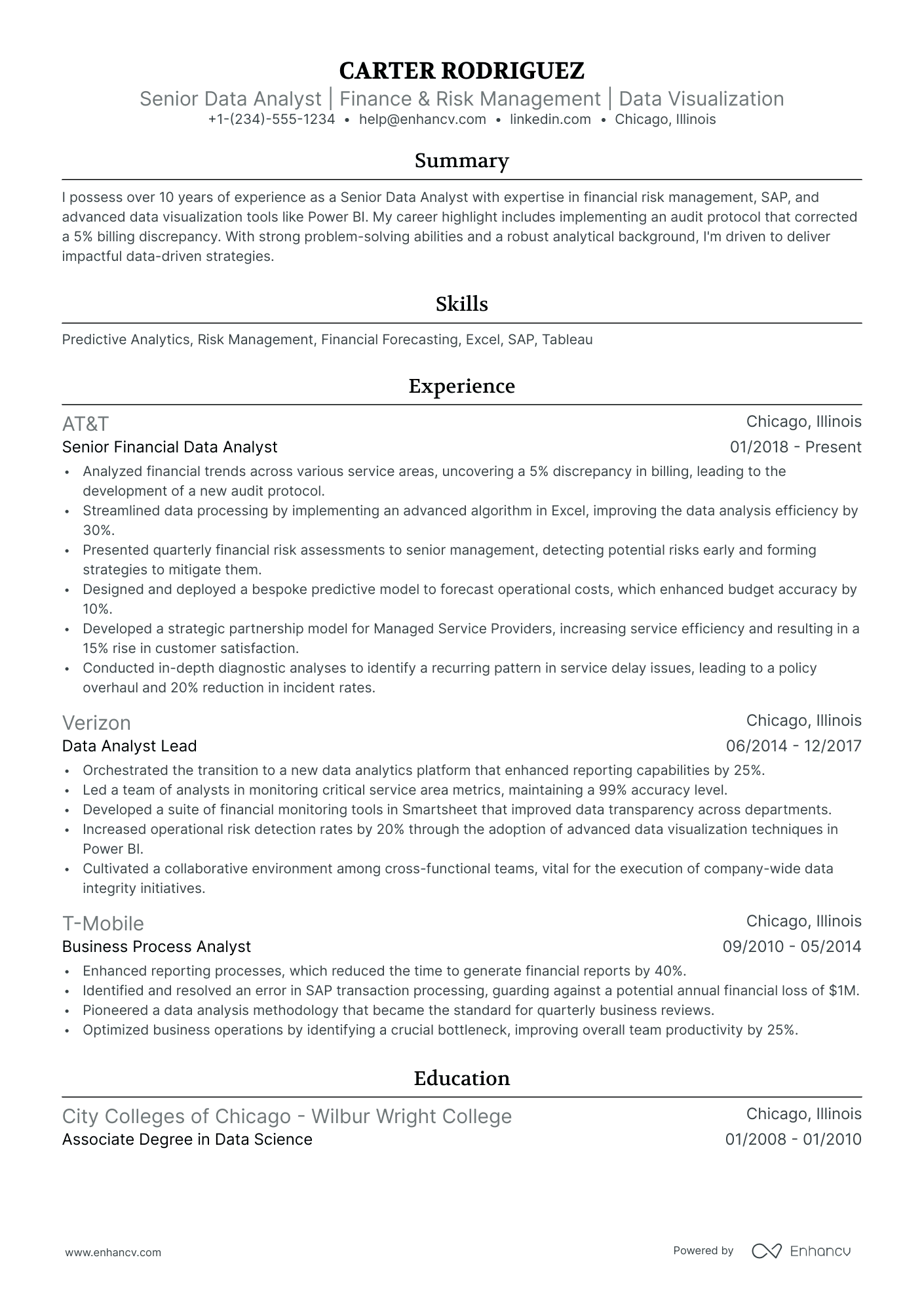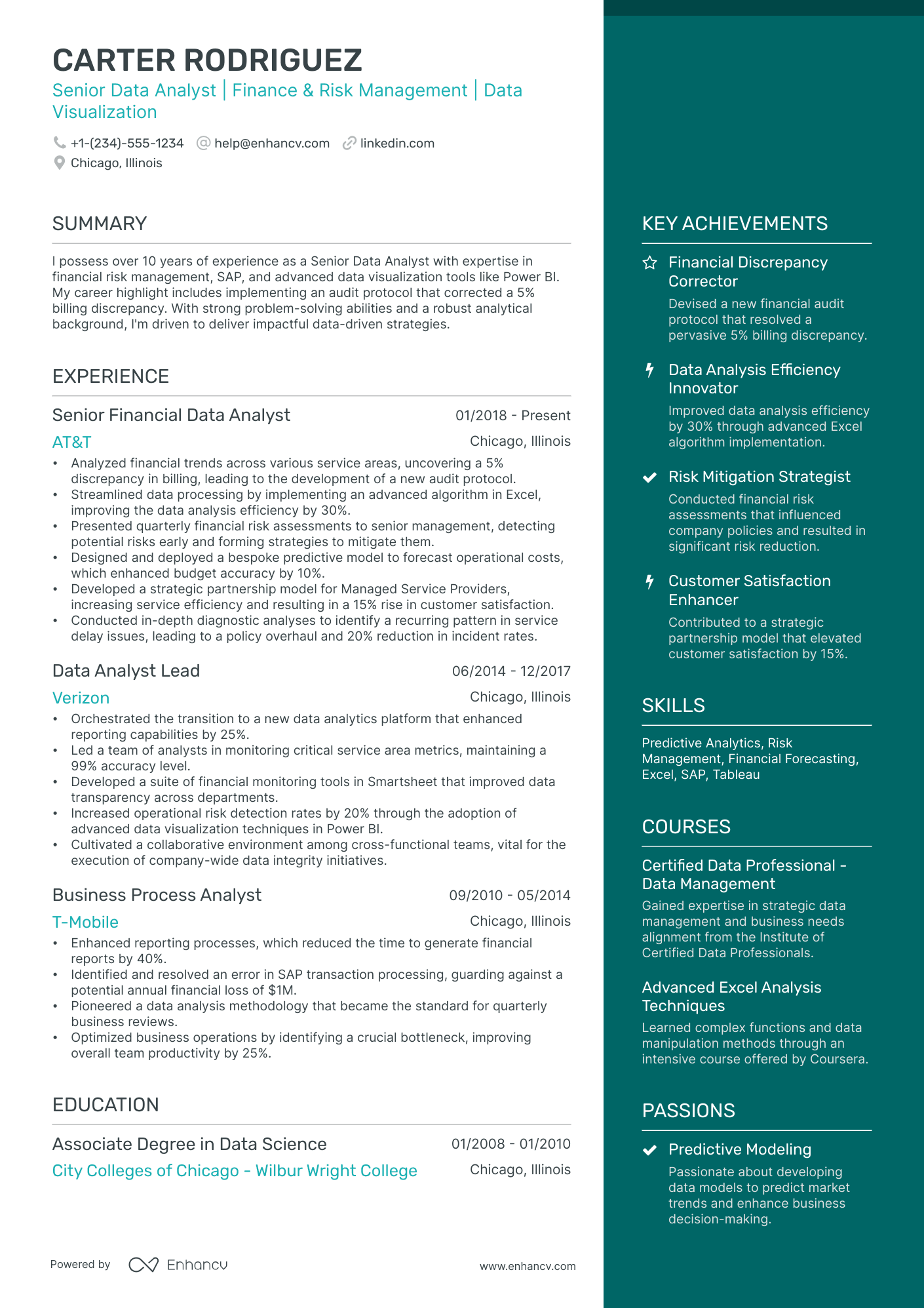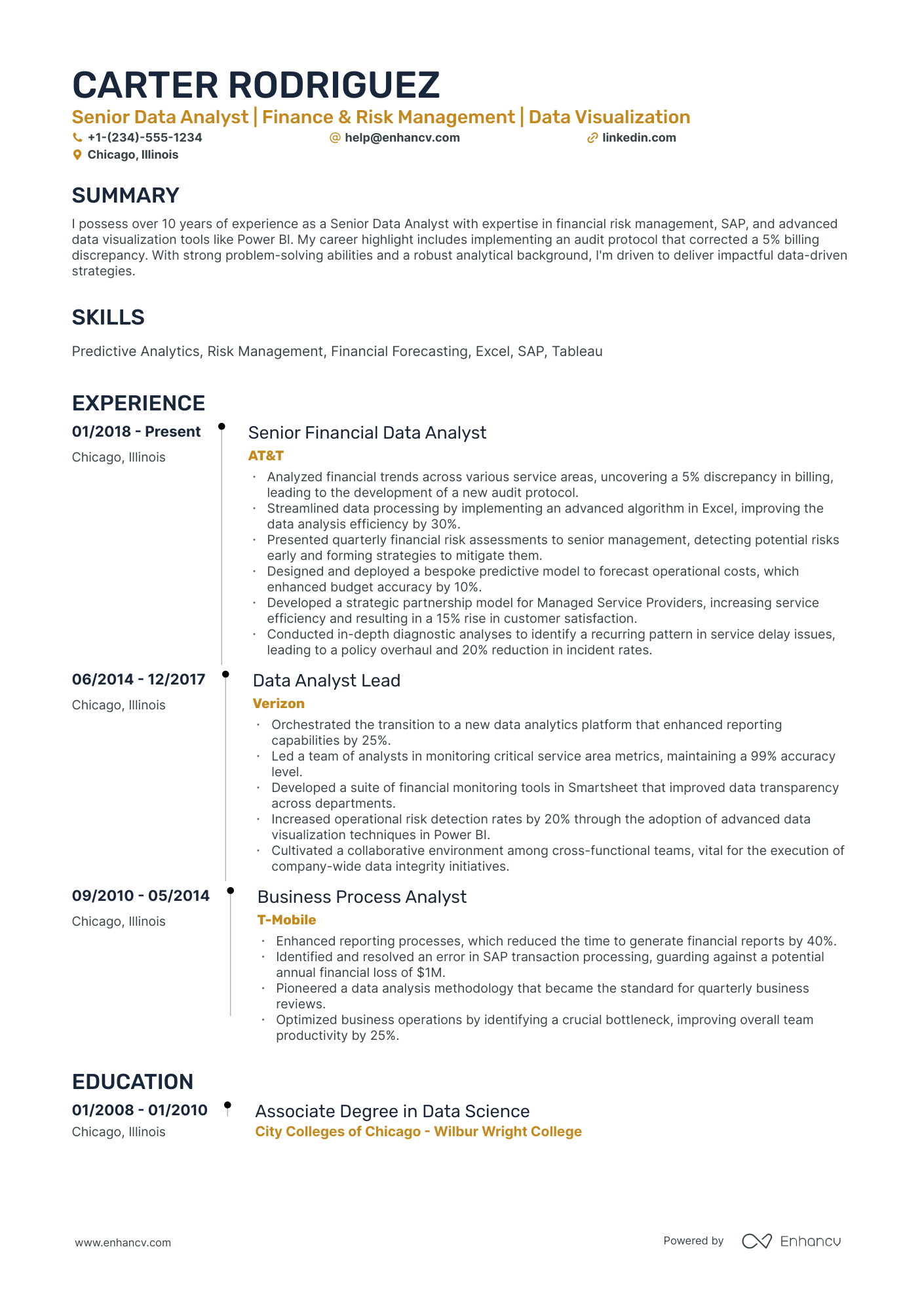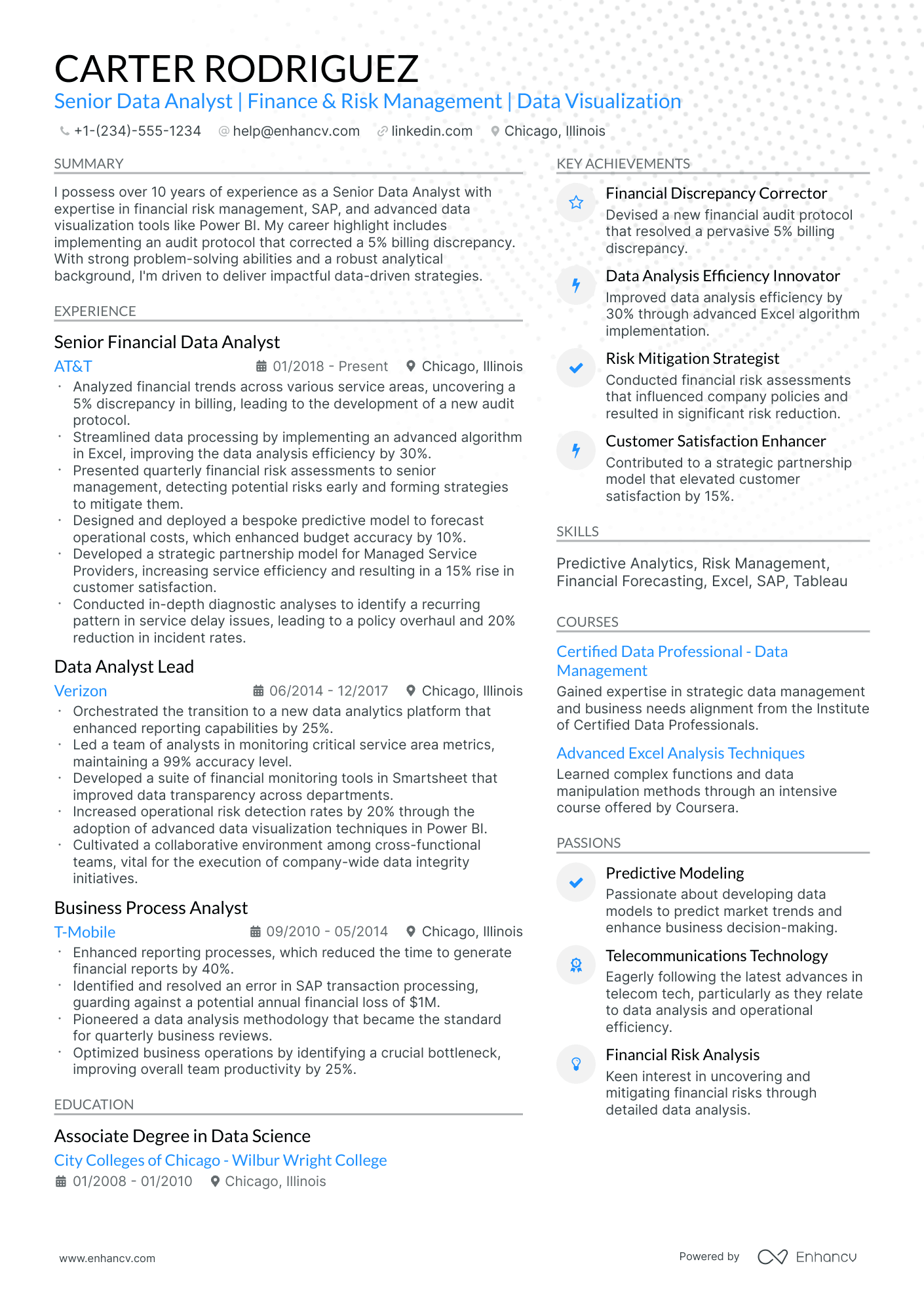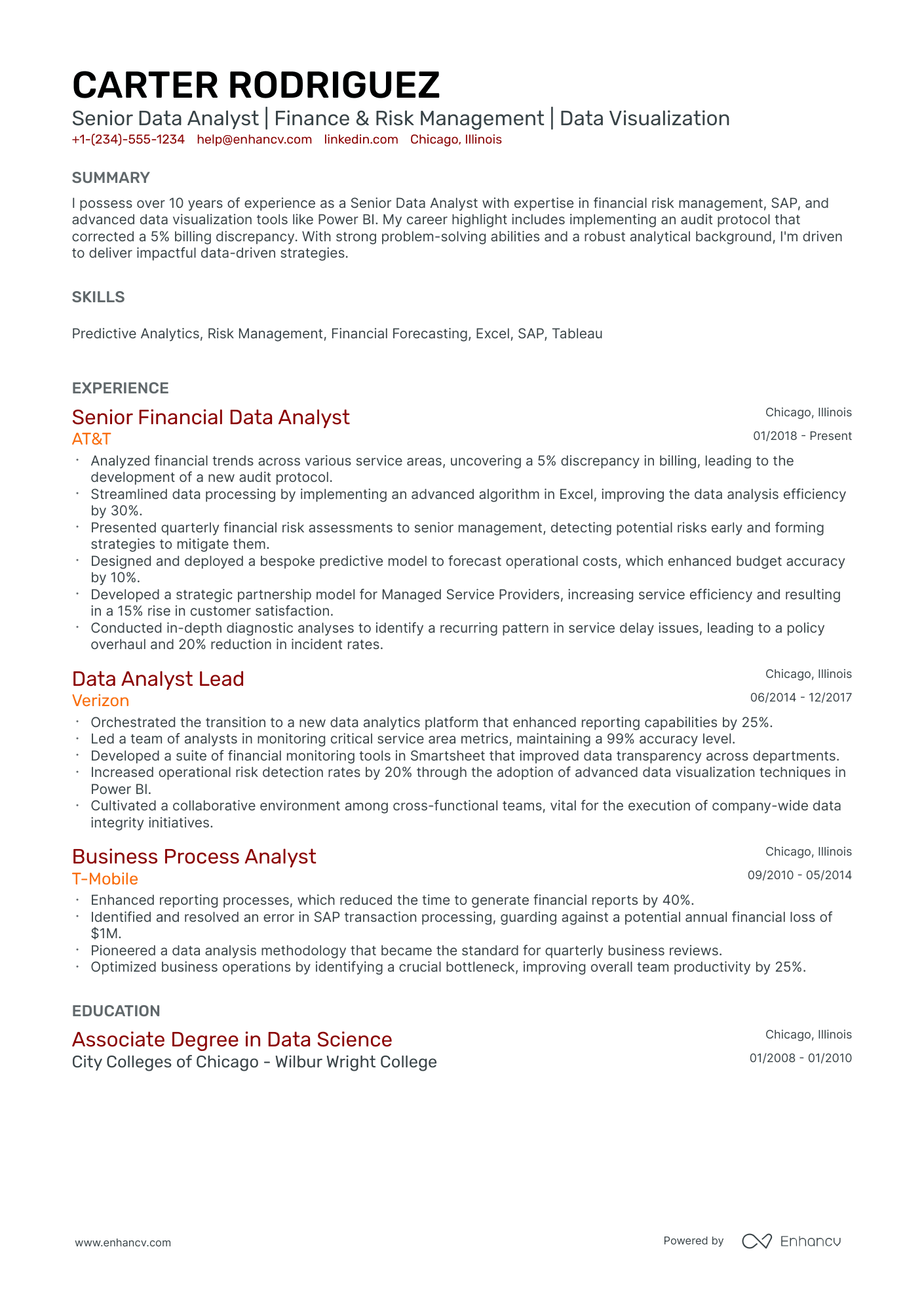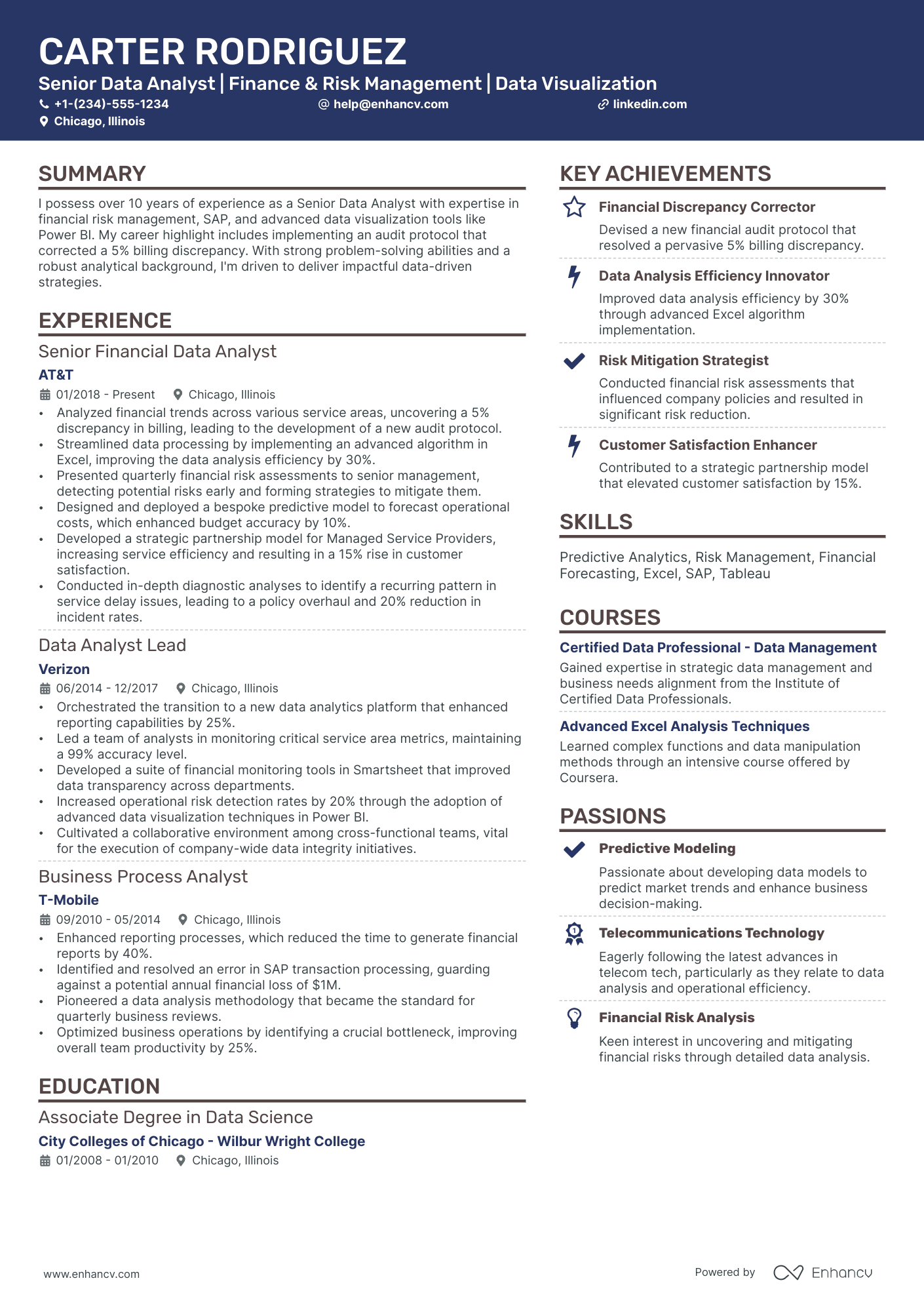As a financial data analyst, condensing complex quantitative analysis into an easily understandable format for your resume can be challenging. Our guide offers step-by-step instructions to help you articulate your analytical prowess effectively, ensuring your resume stands out to potential employers.
- Sample industry-leading examples to learn how to write your best resume yet.
- Improve the experience, education, and achievements section of your resume with insights from resume-writing professionals.
- Curate your technical expertise and personality to stand out amongst the pool of candidates.
- Succinctly focus on your unique skill set all through your financial data analyst resume.
If the financial data analyst resume isn't the right one for you, take a look at other related guides we have:
- Audit Manager Resume Example
- Finance Associate Resume Example
- Billing Manager Resume Example
- Accounting Supervisor Resume Example
- Full Cycle Accounting Resume Example
- Big 4 Accounting Resume Example
- Corporate Financial Analyst Resume Example
- Accounts Clerk Resume Example
- Construction Accounting Resume Example
- Risk Manager Resume Example
The ultimate formula for your financial data analyst resume format
Our best advice on how to style your financial data analyst resume is this - first, take the time to study the job advert requirements.
The resume format you select should ultimately help you better align how your experience matches the specific role.
There are four crucial elements you need to thus take into consideration:
- How you present your experience. If you happen to have plenty of relevant expertise, select the reverse-chronological resume format to organize your experience by dates, starting with the latest.
- Don't go over the top with writing your resume. Instead, stick with a maximum of two-page format to feature what matters most about your profile.
- Headers aren't just for "decoration". The header of your resume helps recruiters allocate your contact details, portfolio, and so much more.
- The PDF format rules. It's the most common practice to submit your financial data analyst resume as a PDF so that your resume doesn't lose its layout. However, make sure the read the job well - in some instances, they might require a doc file.
Think about the market’s preferences – a Canadian resume, for instance, could have a different layout.
Upload & Check Your Resume
Drop your resume here or choose a file. PDF & DOCX only. Max 2MB file size.
PRO TIP
If you're in the process of obtaining your certificate or degree, list the expected date you're supposed to graduate or be certified.
The five (plus) definite sections your resume for a financial data analyst job should include are:
- Header with your headline, contact details, and/or a preview of your work
- Summary (or objective) to pinpoint how your success aligns with the role
- Experience with bullets of your most relevant achievements in the field
- Skills to integrate vital job requirements (both technical and personal)
- Your further dedication to the field, showcased via relevant higher education and/or certifications
What recruiters want to see on your resume:
- Demonstrated proficiency in financial modeling and statistical analysis tools such as Excel, R, Python, or SAS.
- Experience with financial databases and software, like Bloomberg Terminal, FactSet, or S&P Capital IQ.
- A strong background in financial reporting standards and experience preparing financial statements and reports.
- Familiarity with financial regulations and compliance standards relevant to data analysis, such as GDPR or the Sarbanes-Oxley Act.
- Evidence of effective communication skills, specifically the ability to translate complex financial data into understandable insights for decision-making purposes.
Defining your professional expertise in your financial data analyst resume work experience section
The work experience section, often the most detailed part of your resume, is where you discuss your past roles and achievements. To effectively list your experience, consider these four key tips:
- Align your expertise with the job requirements. It's vital to integrate keywords matching the job criteria to pass initial assessments;
- Show, don’t just tell. Quantify your responsibilities by stating your actual achievements in previous roles;
- Include measurable metrics. For instance, how did your performance impact the annual ROI?
- Highlight crucial industry skills. Mention both technological knowledge and interpersonal skills in this section.
These guidelines will help you craft an impressive financial data analyst resume work experience section that is bound to catch recruiters' attention.
- Led the development of automated financial reporting systems that increased reporting efficiency by 35%, reducing human error in quarterly financial projections.
- Analyzed market trends and financial data to assist in the creation of an investment strategy that yielded a 20% return on equity in the first year.
- Managed a portfolio of financial products and conducted rigorous data analysis, which contributed to a 10% year-on-year growth in revenue for the asset class.
- Utilized advanced Excel and SQL to manipulate and analyze large financial datasets, identifying key patterns that influenced strategic investment decisions.
- Performed deep-dive variance analysis on monthly and annual financial reports, spotting critical discrepancies that saved the company over $500,000 in misallocated funds.
- Collaborated with the IT department to implement a new data visualization tool, improving the presentation and accessibility of complex financial data for stakeholders.
- Spearheaded the optimization of financial forecasting models using Python, enhancing predictive accuracy by 25% while reducing the time for model execution.
- Engaged with cross-functional teams to establish a data governance framework that ensured data integrity and compliance with regulatory standards.
- Presented insightful financial analysis reports quarterly to executive leadership, influencing the redirection of $10 million in capital expenditure towards more profitable ventures.
- Designed and maintained complex financial models in R, which accurately forecasted revenue streams leading to a refined budget allocation strategy.
- Played a critical role in a project team that worked on an international merger, ensuring seamless financial data integration from both entities.
- Developed a risk assessment protocol using predictive analytics, which decreased the company's risk exposure by 15% through proactive mitigation strategies.
- Conducted robust financial analysis using BI tools such as Tableau and Power BI to visualize data trends and provided actionable insights to the C-level executives.
- Implemented automated data reconciliation processes between internal and external reporting platforms, enhancing the overall financial data accuracy by 40%.
- Drove the annual budget planning process with data-driven forecasts and scenarios, playing a pivotal role in a 10% reduction in operational costs.
- Optimized the usage of financial analytics tools like SAS and SPSS for complex data analysis, resulting in a 30% improvement in data processing time.
- Coordinated with the compliance department to navigate financial regulations, thereby reducing legal risks associated with data handling.
- Established new performance metrics tailored to SaaS products which led to a more focused and strategic approach in managing the company's cloud-based offerings.
- Performed time-series and econometric modeling on financial data to forecast market movements, contributing to the firm's robust trading strategies.
- Established an automated alert system using Python scripts for real-time anomaly detection in transaction data, which reduced fraudulent activity by 20%.
- Facilitated data-driven decision-making by providing comprehensive financial dashboards and reports, which supported a 15% increase in the annual growth rate.
- Analyzed complex financial datasets to provide insights into customer behavior, contributing to a customer retention improvement strategy that decreased churn by 8%.
- Developed and maintained an internal knowledge base for financial data standards, processes, and best practices, resulting in enhanced team productivity by 20%.
- Played an instrumental role in the due diligence process for potential acquisitions, providing financial data analysis that supported the investment of $50 million in new ventures.
Quantifying impact on your resume
- Detail how you improved financial model accuracy, including the percentage of increased precision, demonstrating your attention to detail and result-oriented mindset.
- Specify any financial reporting processes you automated, including the time saved, to show your technical skills and efficiency gains.
- Highlight significant cost-saving initiatives you identified, quantifying the amount saved, to exhibit your impact on profitability.
- Describe any revenue forecasting activities you led, and include the variance percentage between forecasted and actuals, to showcase predictive accuracy and planning skills.
- Mention the size of the datasets you've managed or analyzed, such as the number of records, to illustrate your capacity to handle complex data environments.
- List the number of financial analysis projects you've completed, to provide a sense of your experience and productivity.
- Quantify the improvement in reporting time or decision-making speed you contributed to, to present your role in operational efficiency.
- Include any experience you have in reducing financial risk, mentioning the percentage decrease in risk exposure, to demonstrate risk management capabilities.
Action verbs for your financial data analyst resume
What can candidates do about their resume, if they have no experience
Job requirements can sometimes be answered by other elements you could make more prominent in your financial data analyst resume.
Thus, you'd be substituting your lack of experience with your relevant:
- Education with details of skills you've obtained that align with the job
- Internships and short-term jobs that are once more dedicated to putting your expertise in the spotlight
- Skills section answering basic and - potentially - more specific job qualifications
- Strengths or accomplishments to show the unique value you present, even as a candidate with less or no professional experience in the industry.
Recommended reads:
PRO TIP
The more time and effort you've put into obtaining the relevant certificate, the closer to the top it should be listed. This is especially important for more senior roles and if the company you're applying for is more forward-facing.
The right balance between hard skills and soft skills for your financial data analyst resume
Wondering what the perfect financial data analyst resume looks like? The candidate's profile meets job requirements by balancing both hard skills and soft skills across their resume.
- Hard skills are all the technologies you're apt at using . Prove you have the right technical background by listing key industry hardware/software in your financial data analyst resume skills section and noteworthy certifications.
- Soft skills are both your personal, mindset, communication, analytical, and problem-solving talents . Use your financial data analyst resume achievements section to show how you've used a particular soft skill to reach a tangible outcome.
When writing about your unique skill set, always make sure to refer back to the job advert to see what are the key requirements. This ensures you've tailored your resume so that it matches closer to what the ideal candidate profile is.
Top skills for your financial data analyst resume:
Excel
SQL
Python
R
Tableau
Power BI
SAS
Financial Modeling
Data Visualization
Statistical Analysis
Analytical Thinking
Attention to Detail
Problem Solving
Communication
Teamwork
Time Management
Critical Thinking
Adaptability
Decision Making
Interpersonal Skills
PRO TIP
If you're in the process of obtaining your certificate or degree, list the expected date you're supposed to graduate or be certified.
Certifications and education: in-demand sections for your financial data analyst resume
Your academic background in the form of certifications on your resume and your higher degree education is important to your application.
The certifications and education sections pinpoint a variety of hard and soft skills you possess, as well as your dedication to the industry.
Add relevant certificates to your financial data analyst resume by:
- Add special achievements or recognitions you've received during your education or certification, only if they're really noteworthy and/or applicable to the role
- Be concise - don't list every and any certificate you've obtained through your career, but instead, select the ones that would be most impressive to the role
- Include the name of the certificate or degree, institution, graduation dates, and certificate license numbers (if possible)
- Organize your education in reverse chronological format, starting with the latest degree you have that's most applicable for the role
Think of the education and certification sections as the further credibility your financial data analyst resume needs to pinpoint your success.
Now, if you're stuck on these resume sections, we've curated a list of the most popular technical certificates across the industry.
Have a look, below:
The top 5 certifications for your financial data analyst resume:
- Chartered Financial Analyst (CFA) - CFA Institute
- Certified Public Accountant (CPA) - American Institute of Certified Public Accountants
- Certified Financial Planner (CFP) - Certified Financial Planner Board of Standards
- Financial Risk Manager (FRM) - Global Association of Risk Professionals
- Chartered Alternative Investment Analyst (CAIA) - CAIA Association
PRO TIP
Showcase any ongoing or recent educational efforts to stay updated in your field.
Recommended reads:
Should you write a resume summary or an objective?
No need to research social media or ask ChatGPT to find out if the summary or objective is right for your financial data analyst resume.
- Experienced candidates always tend to go for resume summaries. The summary is a three to five sentence long paragraph that narrates your career highlights and aligns your experience to the role. In it you can add your top skills and career achievements that are most impressive.
- Junior professionals or those making a career change, should write a resume objective. These shouldn't be longer than five sentences and should detail your career goals . Basically, how you see yourself growing in the current position and how would your experience or skill set could help out your potential employers.
Think of both the resume summary and objective as your opportunity to put your best foot forward - from the get go - answering job requirements with skills.
Use the below real-world financial data analyst professional statements as inspiration for writing your resume summary or objective.
Resume summaries for a financial data analyst job
- Seasoned financial data analyst with over 8 years of experience in leveraging advanced analytical techniques to dissect financial data and inform strategic decisions. Proficient in SQL, Python, and advanced Excel functions, with a track record of optimizing multi-million-dollar portfolios for blue-chip firms in New York's competitive finance sector.
- Dynamic professional with a 10-year tenure in competitive business intelligence roles, now refocusing expertise on financial data analysis. Armed with a deep understanding of data-driven decision-making and equipped with robust SQL and Tableau skills, ready to exploit financial databases and generate actionable insights for a high-stakes London trading floor.
- Formerly a lead data scientist in the tech industry with 5 years of experience managing big data projects, transitioning to the world of finance to apply predictive analytics and machine learning models to forecast market trends. Adept in R, Python, and Hadoop, eager to drive profitability through data insights for a major Frankfurt-based investment bank.
- Accomplished IT project manager making a strategic pivot into financial data analysis, bringing a unique perspective and 7 years of managing complex databases. Skilled in C++, Java, and statistical analysis, and highly motivated to apply technical acumen to unlock financial patterns and provide investment solutions in the bustling Tokyo financial market.
- As a recent graduate with a Master's degree in Data Science and internships at high-profile tech startups, aiming to apply a fresh enthusiasm and comprehensive understanding of statistical analysis, Python, and R programming to analyze financial trends and support data-driven decision-making in a vibrant and challenging environment.
- Keen to begin a career in financial data analysis, armed with a recent MBA with a concentration in Finance, and certification in big data analytics. With a background in academic research and solid exposure to statistical software, intent on uncovering fiscal insights and contributing to the financial success of a forward-thinking institution.
More sections to ensure your financial data analyst resume stands out
If you're looking for additional ways to ensure your financial data analyst application gets noticed, then invest in supplementing your resume with extra sections, like:
These supplementary resume sections show your technical aptitude (with particular technologies and software) and your people skills (gained even outside of work).
Key takeaways
- Your financial data analyst resume is formatted professionally and creates an easy-to-read (and -understand) experience for recruiters;
- You have included all pertinent sections (header, summary/objective, experience, skills, certifications) within your financial data analyst resume;
- Instead of just listing your responsibilities, you've qualified them with skills and the results of your actions;
- Within your financial data analyst resume, you've taken the time to align specific job requirements with your unique expertise, showcasing the value you can provide as a professional;
- Technologies and personal skills are featured across different sections of your financial data analyst resume to achieve the perfect balance.
